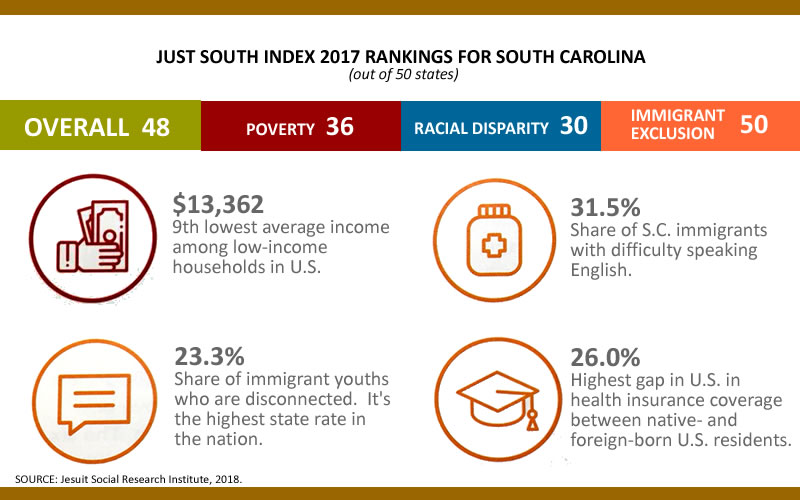
By Andy Brack, editor and publisher | South Carolina has long been a home for immigrants — from the English, enslaved Africans and French Huguenots to Germans, Irish and, most recently, people from Latin America.
But these days, we shamefully ignore our rich immigrant soup, caught in the guttersnipe of national politics about “those people” who want to come to the United States, just like our forefathers moved here. And just like the grandfather of the forgetful current president, who has embarrassingly branded undocumented immigrants as “animals.”
 A new social justice report says South Carolina ranks dead last in how it excludes immigrants in thought, word and deed. Quite simply, we generally aren’t welcoming to immigrants, despite a reputation for being polite to visitors.
A new social justice report says South Carolina ranks dead last in how it excludes immigrants in thought, word and deed. Quite simply, we generally aren’t welcoming to immigrants, despite a reputation for being polite to visitors.
The Jesuit Social Research Institute at Loyola University in New Orleans recently released Just South Index 2017, a data-backed assessment of nine social justice indicators that look at wealth, opportunity and privilege. “Social injustice,” the report explains, “is any policy or system that detracts from the common good or undermines human dignity.” [NOTE: Quote corrected after original publication.]
The 42-page report calls attention to social justice deficits in three general areas: poverty, racial disparity and immigrant exclusion. Overall, South Carolina ranked third from the bottom in the Just South Index. But surprisingly, it wasn’t poverty (#36 of 50 states) or racial disparity (#30) that pushed us to the bottom. It was how we treat immigrants, which was based on three indicators:
- Rate of disconnected immigrant youths. Young adults (18 to 25) who aren’t in school, aren’t working or don’t have a college degree are considered disconnected. Those who are immigrants often fall into this category, susceptible to barriers for educational and other opportunities. Some 23.3 percent of immigrant youths in South Carolina are disconnected, the report says, the highest rate in the nation, which has a 14.6 percent rate, the report says.
- English language problems. South Carolina ranks 38th in the percentage of immigrants who have difficulty speaking English, but the state’s share of immigrants with language trouble (31.5 percent) is slightly lower than the national average (32.6 percent).
- Health insurance gaps. South Carolina also ranks last in the gap in the health insurance rate between foreign-born and native-born residents. The percentage gap between the two groups is 26 percent, compared to 13.8 percent nationally.
Bottom line: We fail to offer good opportunities to immigrant young adults, including making health care affordable, and we can do better in helping them learn English.
Sue Berkowitz, executive director of the S.C. Appleseed Legal Justice Center in Columbia, isn’t surprised by the Catholic university’s report, in part because of how institutions exclude immigrants.

“There had been — and still is — ongoing legislative/administrative actions that prove our state’s political leaders are targeting immigrants,” she told us, noting passage of anti-immigration laws and the GOP’s current obsession with sanctuary cities.
“Our state does not allow a whole category of documented individuals to get professional and technical licenses or get instate tuition,” she said. “Young immigrants, DACA beneficiaries or ‘dreamers’ who lived their entire life here [who were] brought to this country when children, are not allowed to get professional licenses or in-state tuition. Our own attorney general is suing the current administration to strip them of their documentation. All of this is a prime example of social exclusion.”
Our state can do more to include, not exclude. As outlined in the Just South report, states can reduce barriers to post-secondary education, bolster efforts for English as a Second Language programs, improve family literacy programs, encourage access of disconnected youths to job training programs and expand mentoring programs.
South Carolina, like most other Southern states, also doesn’t allow legally-residing immigrant children and pregnant mothers to use public health insurance without a five-year waiting period. State government and businesses should take steps to close the health insurance gap faced by immigrants.
We can do better. Let’s be more than a state that says “Lord, have mercy” or “Bless their hearts” to new immigrants to South Carolina. Let’s stop excluding people already here who might sound or look different. Let’s embrace their talents so they become productive residents who contribute to our culture and economy.
- Have a comment? Send to: feedback@statehousereport.com.



I am a bit curious. If this is the population of concern:
“Young adults (18 to 25) who aren’t in school, aren’t working or don’t have a college degree are considered disconnected.
I would translate that to mean youth who don’t or can’t hold a job
This is “disconnected”?
For pete’s sake – they’re unemployed.
It would seem that would beg further inquiry of job placement services that includes training / education to overcome limitations.
It would seem to beg further inquiry into what these ‘disconnected’ youth do with their time to exclude status as both ‘disconnected’ and drug pusher.
Just saying … the data seems a bit thin.
Here is an exact quote from the article above and from the printed article that appeared in the Florence Morning News on 18 May 2018 – “Social justice,” the report explains, ” is any policy or system that detracts for [sic] the common good or undermines human dignity.”
Puzzled that your definition of ‘social justice’ should be so different from what you seemed to be trying to say, I looked up your source, Just South Index 2017, on the Internet.
You did, indeed, misquote your source twice in that one sentence ! The most serious misquote changed the intent of your source, the Report, by 180 degrees !
Here is what the Report (your source) actually said, “Social INJUSTICE is any policy or system that detracts FROM the common good or undermines human dignity.” [Caps mine.]
Furthermore, at the end of your article above and in the Morning News, there is an invitation to make a comment via feedback@statehousereport.com . I did send an e-mail message to this address. It bounced !
I can’t say how discouraging it is to see such carelessness in a prominent member of the Press.
Ben. You are right. Sloppy typos. They got by me, a proofreader and two editors. Thanks for pointing them out. You shouldn’t have to. Will fix column and make a note in this week’s edition. (By the way, our email server died Friday and is in the process of being rebuilt; emails can’t be delivered until that happens, unfortunately.)